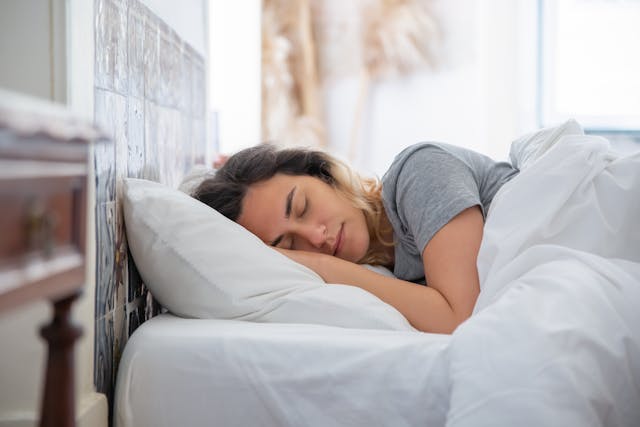Sleep is one of the most important pillars of health, yet it is often overlooked. Many people struggle to fall asleep, stay asleep, or wake up feeling rested. Poor sleep doesn’t just make us tired—it affects mood, focus, and overall mental health.
The good news is that small daily habits, known as sleep hygiene, can make a big difference. By creating the right environment and routines, we can train our bodies and minds to rest more deeply and wake up refreshed.
Why Sleep Matters for Mental Health
Sleep is more than just physical rest—it’s a critical process for brain function and emotional balance.
- According to the Centers for Disease Control and Prevention (CDC), adults need 7–9 hours of sleep each night for optimal health【CDC, 2022】.
- Research published in Nature Reviews Neuroscience shows that sleep strengthens memory, helps process emotions, and supports mental clarity【Walker, 2017】.
- Chronic sleep deprivation is linked to higher risks of depression, anxiety, and emotional instability【Harvard Medical School, 2019.
When we sleep well, we cope better with stress, regulate emotions, and feel more resilient.
What Is Sleep Hygiene?
Sleep hygiene refers to healthy habits and environmental practices that promote good sleep. Just as dental hygiene keeps our teeth strong, sleep hygiene keeps our rest restorative and consistent.
These practices focus on two main areas:
- Daily routines that support the body’s natural sleep-wake cycle.
- Bedroom environment that makes rest easier and deeper.
Signs of Poor Sleep Hygiene
You may need to improve sleep hygiene if you experience:
- Trouble falling or staying asleep.
- Frequent daytime fatigue.
- Relying heavily on caffeine to stay alert.
- Irregular sleep schedules, especially on weekends.
These issues are common but can often be improved by adjusting habits.
Key Habits for Better Sleep Hygiene
1. Keep a Consistent Sleep Schedule
Going to bed and waking up at the same time every day trains your body’s circadian rhythm. Even on weekends, sticking to a regular schedule prevents “social jet lag” and makes falling asleep easier.
2. Create a Relaxing Bedtime Routine
Wind-down activities signal to the body that it’s time for rest. Try reading, stretching, journaling, or listening to calming music. Avoid stressful conversations or heavy work before bed.
3. Limit Screen Time Before Bed
The blue light from phones, tablets, and laptops suppresses melatonin, the hormone that regulates sleep. A study in Proceedings of the National Academy of Sciences found that evening screen use delayed sleep and reduced restfulness【Chang et al., 2015】. Aim to turn off devices at least 30–60 minutes before bedtime.
4. Optimize Your Sleep Environment
A comfortable and quiet bedroom makes a big difference. Focus on:
- Temperature: Cool rooms around 65°F (18°C) are ideal.
- Light: Keep the room dark with curtains or a sleep mask.
- Noise: Use earplugs, white noise, or calming sounds if needed.
- Comfort: Invest in supportive pillows and a quality mattress.
5. Watch Caffeine and Alcohol Intake
- Caffeine can stay in the body for 6–8 hours, so avoid it in the afternoon and evening.
- Alcohol may make you fall asleep faster but disrupts deep sleep later in the night.
6. Exercise, but Not Too Late
Regular physical activity improves sleep quality. However, intense exercise close to bedtime can be too stimulating. Morning or afternoon workouts work best for most people.
7. Avoid Long or Late Naps
Short naps (20–30 minutes) can refresh the mind. But long or late naps interfere with nighttime sleep. If you nap, aim for earlier in the day.
The Role of Mindset in Sleep
Sometimes, people get anxious about not sleeping, which makes the problem worse. Mindfulness and relaxation techniques can help.
- Deep breathing exercises calm the nervous system.
- Progressive muscle relaxation reduces tension in the body.
- Mindful journaling before bed can clear racing thoughts.
These practices reduce the pressure to “force sleep” and instead create conditions where sleep comes naturally.
The Connection Between Sleep Hygiene and Mental Health
Poor sleep and mental health issues often create a cycle:
- Anxiety and depression disrupt sleep.
- Lack of sleep increases anxiety and depressive symptoms.
Breaking this cycle with better sleep hygiene is a powerful step toward mental wellness. According to the National Sleep Foundation, people who practice good sleep hygiene report better mood, improved focus, and stronger emotional regulation【NSF, 2021】.
When to Seek Help
If good sleep hygiene doesn’t resolve sleep problems, professional support may be needed. Persistent insomnia, loud snoring, or excessive daytime sleepiness can be signs of sleep disorders like sleep apnea. A doctor or sleep specialist can provide guidance and treatment.
Practical Bedtime Routine Example
Here’s how a simple evening routine might look:
- 9:00 pm – Turn off electronics, dim the lights.
- 9:15 pm – Take a warm shower or stretch gently.
- 9:30 pm – Journal for 10 minutes, noting three things you’re grateful for.
- 9:45 pm – Read a calming book or listen to soft music.
- 10:00 pm – Lights out.
This kind of routine signals to the brain and body that it’s time to rest.
Conclusion
Good sleep doesn’t happen by accident—it’s the result of consistent habits and a supportive environment. Sleep hygiene offers simple, practical steps to create restful nights and energized days.




